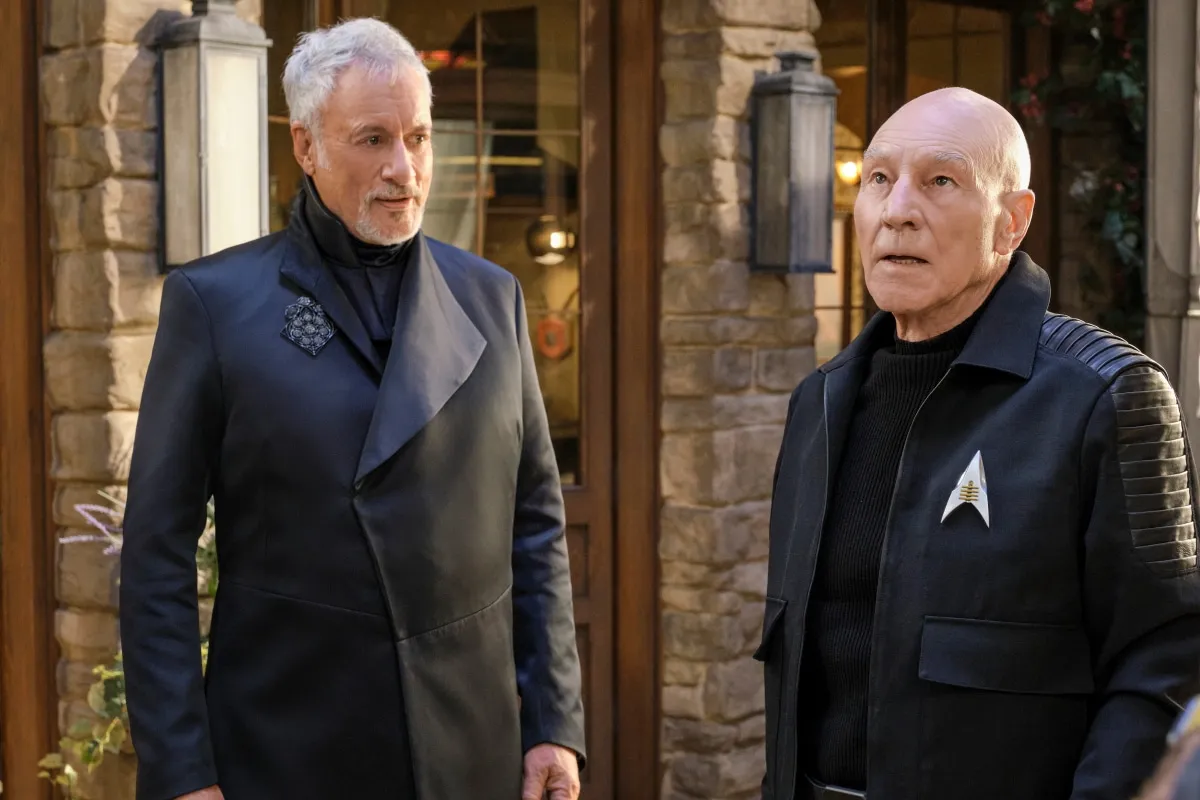This discussion and review contains some spoilers for Star Trek: Picard season 2, episode 2, “Penance.”
The dystopian alternate world is a science fiction cliché and a Star Trek institution.
These glimpses of dysfunctional and broken worlds often serve as cautionary tales, as warnings that the world in which the audience exists is fragile and that nothing is actually promised. As such, it makes sense that the Star Trek franchise has repeatedly and consistently confronted its characters with alternate and imagined worlds that underscore the volatility of the franchise’s utopian future. These characters ended up in paradise, but there were alternatives.
The mirror universe is perhaps the most obvious example. It was introduced in the original Star Trek, in the episode “Mirror, Mirror.” The mirror universe is a world in which mankind has rejected utopian idealism, where familiar characters have often been warped by circumstance. The mirror universe is a fixture of Star Trek. It appeared almost once a season on Deep Space Nine. Enterprise devoted a two-parter in its final season to the concept. Discovery spent half its first season there.
However, there are plenty of other examples. Episodes like “The Visitor” and “Twilight” confront their series leads with dystopian possible futures. Voyager was preoccupied with alternate versions of its crew, whether doomed counterparts created by strange phenomena in episodes like “Deadlock” or “Course: Oblivion” or fascistic holographic stand-ins featured in episodes like “Living Witness” or “Author, Author.” Star Trek is haunted by the fear its utopian future is not assured.

However, The Next Generation is notable as the only Star Trek series to really eschew these dystopian alternatives. The show would occasionally feature time loops that doomed the crew in episodes like “Cause and Effect,” but they were science fiction high concepts. Individuals were occasionally offered glimpses into possible alternate lives in stories like “Future Imperfect,” “Tapestry,” or “The Inner Light,” but these weren’t apocalyptic. Starfleet remained a constant.
Fans are acutely aware of this gap as it exists in the context of The Next Generation. There is a wealth of supplemental and spin-off material preoccupied with the darker mirror universe version of The Next Generation, from Diane Duane’s 1994 classic novel Dark Mirror to the year-long Mirror War comic event being published by IDW. So there is something faintly completionist about the way that “Penance” finally decides to take Jean-Luc Picard (Patrick Stewart) “through a mirror darkly.”
To be fair, in that sense, “Penance” at least manages to do something new with its central character, particularly given the level of nostalgia at play in the first episode of Star Trek: Picard season 2, “The Star Gazer.” More than that, it makes a certain amount of thematic sense to confront Jean-Luc Picard with this sort of dystopian alternate universe. After all, given that The Next Generation produced 178 episodes, the fact that the show never even contemplated an alternative to its worldview is a conscious choice worth confronting.
One of the most interesting things about Picard is the way that the show exists very much in conversation with The Next Generation, at the distance of a quarter of a century. The Next Generation never seriously considered any alternative to its utopia because it was the product of a time that never imagined things could be different. The Next Generation was incapable of imagining that things could be anything but what they were.

In contrast, Picard exists in a world that has learned that the relative peace and stability of the 1990s was not promised to the generation that followed. The generation that emerged from the idealist 1990s found themselves confronted by “a succession of once-in-a-lifetime” events: the War on Terror, a global pandemic, two financial downturns, an attempted coup, and the largest land war in Europe since the end of the Second World War with the increased threat of nuclear annihilation.
It makes sense that time travel is a major plot point in Star Trek: Picard season 2. If a random American were transported in time from 1994 to 2022, they would share Jean-Luc Picard’s sense of shock and disturbance on being confronted with what Picard describes as “a polluted totalitarian nightmare.” Then again, as Picard assures the rest of the cast, “This is not another reality. This is our reality.” The show is not particularly subtle in its metaphor.
After all, Picard wakes up in a universe to discover that the Federation has been replaced with the “Confederation,” a very charged term in modern political discourse. It’s the flip side of the coin to how The Next Generation mirrored the America of 1994. This is, to quote the Borg Queen (Annie Wersching), “a fiction of the what-if of what was.” A shield glistens in the sky over Earth, suggesting Picard built a wall to keep outsiders away. His estate is tended by exploited immigrant labor.
There is something disconcerting in peering into an alternate world where Jean-Luc Picard, a bastion of civility and decency, is a conquering tyrant. Then again, this too feels like an acknowledgement of the gulf that exists between The Next Generation and Picard. Many of those viewers who grew up with The Next Generation have had to confront the reality that their icons may have feet of clay. That may even be true of those who worked on and oversaw The Next Generation.

That said, there is a sense that “Penance” rushes through a lot of this. One of the more common criticisms of modern Star Trek is that the franchise has moved away from the episodic storytelling model in favor of serialization. While there is some truth to that, even if it overlooks Lower Decks, it is notable that the first three episodes of Picard season 2 are clearly structured as individual episodes; each one presents a unique challenge, a specific goal, and a change in setting.
While there are fans clamoring for the return of more episodic storytelling to Star Trek, as promised by Strange New Worlds, “Penance” suggests the limitations of such an approach. Within minutes of landing in this strange dystopian alternate universe, the characters have already figured out how to escape from it and set a course of action. As a result, there’s no opportunity to really sit with the mood and the atmosphere of this darker world, because the plot needs to move to the next beat.
This leaves “Penance” much more compelling conceptually and thematically than in execution. This is most obvious with Seven of Nine (Jeri Ryan). In her own life, Seven spent most of her childhood and young adult life complicit in the assimilation (and therefore eradication) of entire cultures. The question of her complicity in this, and the extent to which she could make free choices in that context, was the source of much drama in episodes like “Prey” or “Survival Instinct.”
In theory, “Penance” raises an interesting question. What does it mean for somebody who was shaped by their unwilling participation in such horrors to wake up in a world where they have been actively complicit in similar atrocities? That’s a compelling character hook for Seven of Nine, particularly given Picard’s fascination with her reintegration into human society as an individual with her own autonomy rather than as a student of Janeway (Kate Mulgrew). However, there’s no room for that here.
There are all sorts of other interesting character threads that could be explored, such as the question of whether Agnes Jurati (Alison Pill) is really so different in this universe. After all, she was prepared to do terrible things in the first season in service of Commodore Oh (Tamlyn Tomita), so it presumably wouldn’t take too much more to push her into active participation in Confederation atrocities. However, all of this is brushed aside in the rush to the episode’s cliffhanger.

Still, there are some interesting elements in “Penance.” It is very much an episode of Picard and reflects the spin-off’s evolving approach to the title character. Stewart has talked a great deal about not wanting Picard to be a simple retread of The Next Generation, and that has meant understanding that Picard himself could not be the person he was 25 years ago. A large part of this has seen Stewart and Picard merge, a symbiosis of actor and character.
“One of the things that I’ve come to understand is that as I talk a lot about Picard, what I find is I’m talking about myself,” Stewart told the BBC in 2011. Talking to NPR in July 2020, he remarked that “the longer that we did Next Generation, the more of Patrick Stewart got into Jean-Luc Picard.” What is interesting about Picard is the way that the show has acknowledged this and folded it into its narrative. This is reflected in the recurring preoccupation with Picard as a performer.
Of course, The Next Generation would occasionally lean into this, with Picard playing Dixon Hill on the holodeck or a pirate in “Gambit” or a jealous lover in “Ménage à Troi.” However, it is not as pronounced as it is in Picard. As with “Stardust Rag City” in the first season of Star Trek: Picard, “Penance” finds Picard forced to perform. He’s more of an actor than a commanding officer, essentially guiding the supporting cast through an improvisational exercise. It’s a clever blending of actor and character.
“Penance” is a compelling concept that is somewhat tempered by a rushed execution, suffering from the season’s breakneck pacing and the show’s tendency to prioritize action over character. Still, there’s some interesting engagement with The Next Generation to be found here.






Published: Mar 10, 2022 11:00 am